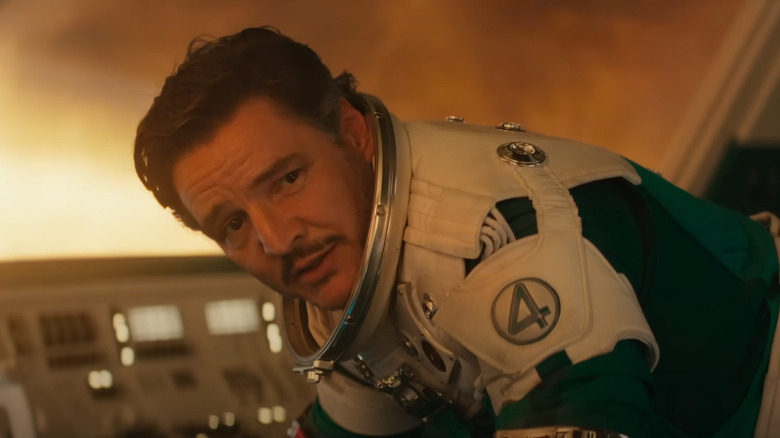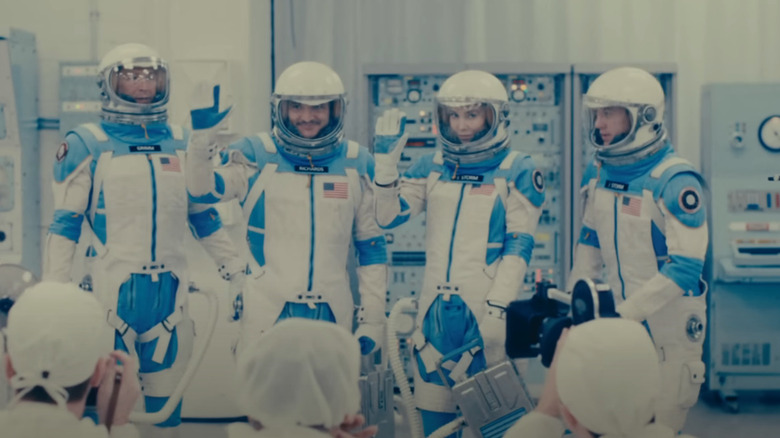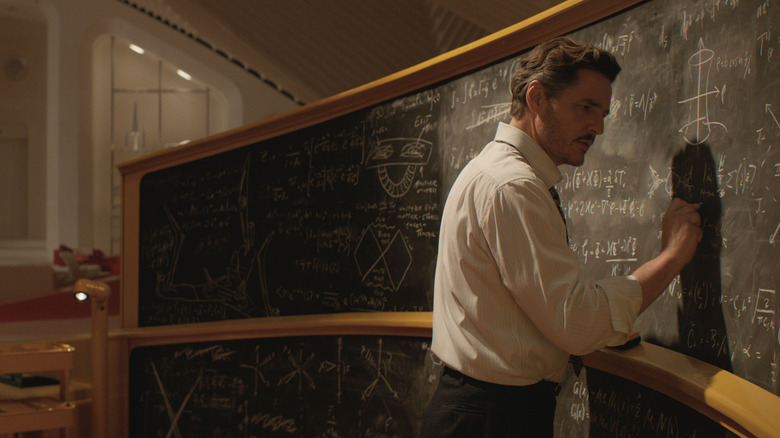Marvel's Fantastic Four Reboot Borrows One Valuable Lesson From Star Trek
Potential spoilers for "The Fantastic Four: First Steps" follow.
Matt Shakman's "The Fantastic Four: First Steps" is set in the confines of the Marvel Cinematic Universe — it's film #37 in the series — but the filmmakers wisely distance the action of this film from its peers by shifting events over to a parallel universe. "First Steps" is set on Earth 828 where the Fantastic Four are the only superheroes on the clock, and there are scant villains. The year appears to be 1961, as everything bears the bubbly, retro-kitsch aesthetic of a vintage Frigidaire catalogue. Yet there are also flying cars, faster-than-light starships, powerful computers, space scanning satellites, and a semi-sentient robot helper named H.E.R.B.I.E.
The Fantastic Four are indeed superheroes in this universe, and they acquired their powers in a fashion familiar to Marvel fans: Reed Richards (Pedro Pascal), Sue Storm (Vanessa Kirby), Johnny Storm (Jonathan Quinn), and Ben Grimm (Ebon Moss-Bachrach) were bombarded by cosmic rays during a space voyage, and returned with stretching, invisibility, flame powers, and an indestructible rock body, respectively. And, yes, they use their powers to fight villains such as Mole Man (Paul Walter Hauser) and the Puppet Master (off-screen). There is an amusing scene of Reed kicking an evil monkey into the Hudson River.
But the FF are no mere vigilantes or freelance soldiers. Indeed, their superpowers seem to have served a much more utopian function. Being the Fantastic Four brought them into the public eye, allowing the public to appreciate the brilliant new scientific breakthroughs of Reed Richards, and the stirring diplomatic capabilities of Sue Storm. Reed has become a titan of industry, whose breakthroughs have been spread to the populace at large. He's half the reason that Earth 828 is a technological utopia. The other half comes from Sue's ability to unite world leaders and create, more or less, a global union of peace.
They were calm, collected, intelligent, enlightened people, and the public actually bothered to listen. Essentially, the Fantastic Four created the utopia of "Star Trek."
The Fantastic Four created a Star Trek-like utopia
"Star Trek," recall, is set in a future where humanity has managed to survive and save itself. In Trek's timeline, Earth underwent a series of devastating global wars, driving itself to the brink of extinction. In the post-war period, a brilliant scientist invented a faster-than-light engine which, during its test-flight, attracted the attention of some passing Vulcans. When humanity learned that they had entered a larger, galactic community, they changed their ways. Learning, exploration, and diplomacy became the new driving forces of our species. By the time we got to the events of the original "Star Trek" series, capitalism was long dead, Earth was united, all nations and races worked together in harmony, and technology was used for positive ends. Food replicators more or less eliminated hunger, and faster-than-light starships could deliver resources to anywhere they might be needed.
Audiences could relax, knowing that the larger problems of the galaxy were taken care of. In this universe, humanity had the leeway to study quasars, open diplomatic relations with new species, invent new miracle tech, and allow the best and the brightest to flourish. In "Star Trek," young people (see: Wesley Crusher, or Nog) are encouraged to join Starfleet and become even smarter and better than they already are.
This seems to be the ethos of "The Fantastic Four: New Steps." Because of Reed Richards, all of Earth is now united. It may be 1961, but it's an alternate version of the year when there are no wars, no civil right struggles, no hate. People of all races are present in positions of power, implying that the FF allowed social progress to happen at a much more rapid pace than in our own universe. Like in "Star Trek," "Fantastic Four" seems to be set in a universe where everyone is encouraged to be better. We slip up, sure, but are open-minded enough to listen to good ideas when we hear them.
Heroes do more than fight
The Marvel Cinematic Universe has always been a bit frustrating when it comes to its view of the outside world. As the series has progressed, the world has seen global and universal cataclysms, as well as the introduction of magic and miracle tech. And yet, as it was stated in "Ant-Man and the Wasp Quantumania," there's still a homelessness problem. People still need to work crappy jobs to make ends meet, while others are still getting sick and dying. If the superheroes of the Marvel universe are so benevolent, why haven't they used their powers to transform the world at large into a better place? Why hog all that tech for yourself? Thor can summon lightning, and Iron Man can build miracle batteries. Surely power is now plentiful and free across the planet, right?
Reed Richards finally did that. He used superhero tech to change the world. Huzzah. Unlike most of the Marvel heroes, he doesn't go into any situation expecting to fight. He's like a Starfleet engineer, more eager to build elegant, mechanical solutions that prevent violence. He will never be the start of it.
Also, just like in "Star Trek," the Fantastic Four never think to use violence as a first choice. As mentioned, they have gotten into a few scrapes, but they would rather find a technological or diplomatic solution before they resort to weaponry. The Fantastic Four is not well-armed, nor are they bruisers. Even the Thing doesn't like that he's known for clobberin'. When they learn about an all-powerful, world-eating space deity called Galactus (Ralph Ineson), their first course of action is to fly to his location and negotiate with him. This is something Captain Picard might do. Sure, the FF starship has a laser gun on it, just as Starfleet vessels have phasers, but I get the impression that those weapons aren't a first resort, or even a fifth.
"Star Trek" is inspiring because it espouses pacifism, teaching viewers that peace, tech, and enlightenment are better than fighting. "First Steps" has the same ideas behind it.


